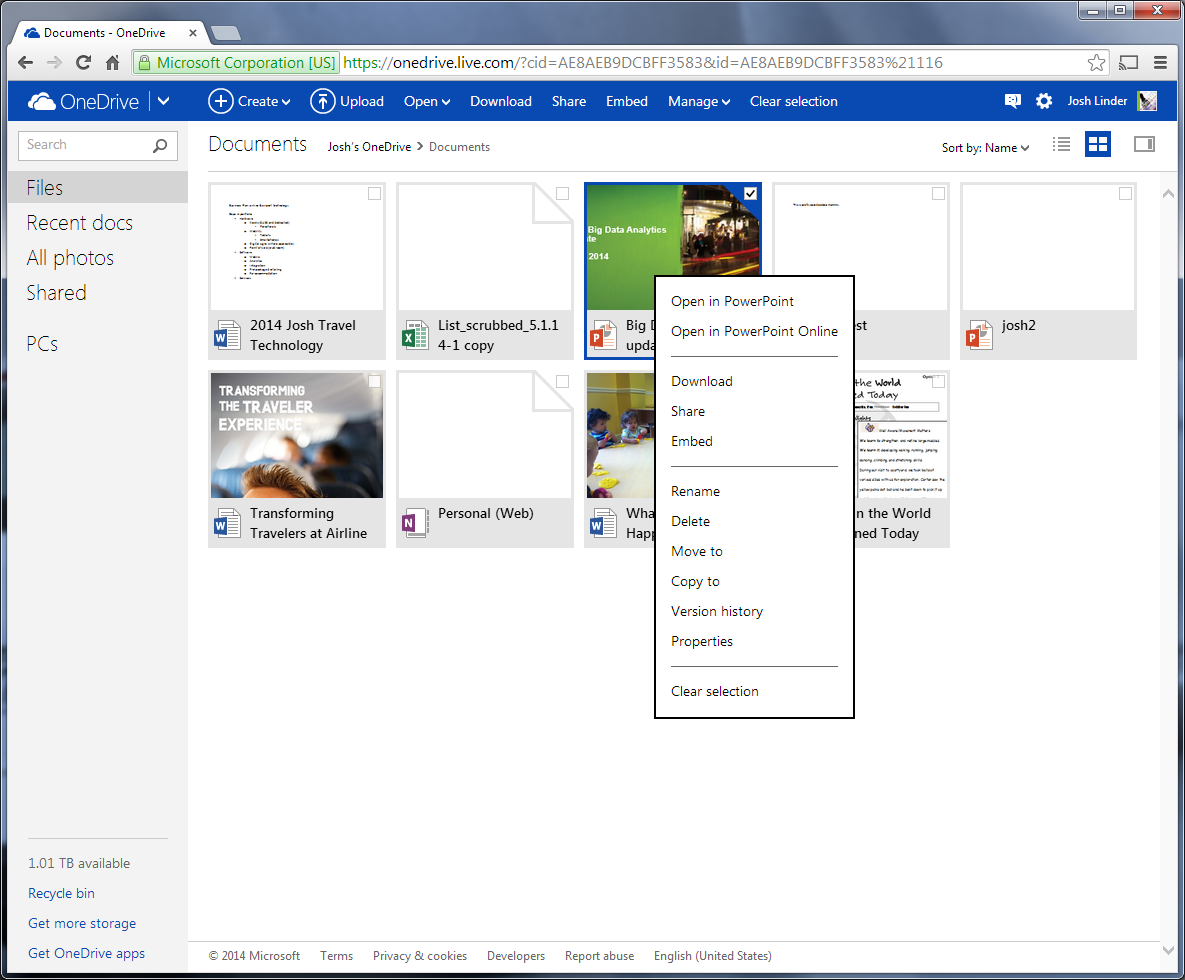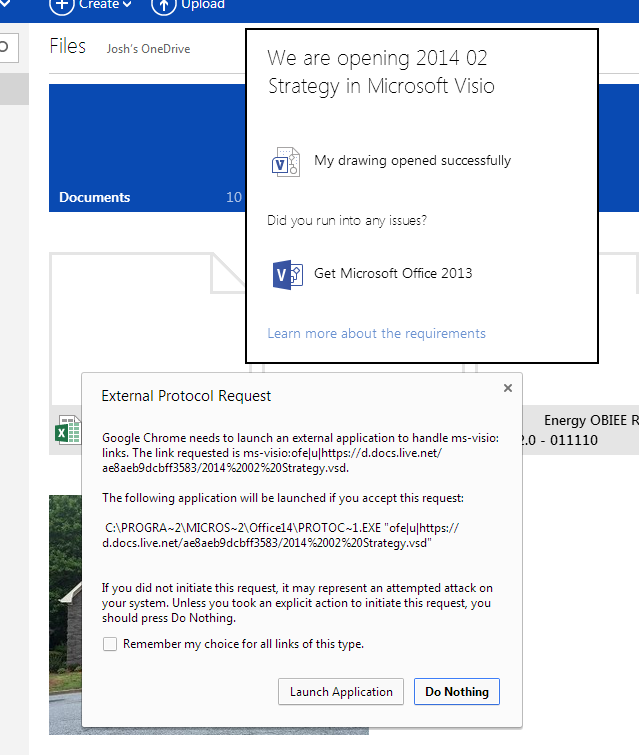Cloud Storage Providers: Comparison Of Features And Prices
Microsoft OneDrive Cloud Storage - Pricing And Features
Why you can trust Tom's Hardware
Microsoft rebranded SkyDrive as OneDrive earlier this year, and continues as a service primarily centered around Microsoft Office documents. While any file can be stored and shared in OneDrive, the greatest benefit is gained when saving, viewing and editing Word, Excel and PowerPoint documents.
The core file storage component has improved because you get a larger amount of storage at a much lower cost, making OneDrive competitive with the pure-play providers. As of the summer of 2014, Microsoft increased the quota for paying Office 365 users to 1TB each for up to five users. The free service increased from 7GB to 15GB.
The ultimate value proposition of OneDrive revolves around tight Microsoft Office file and application integration. While the first product to utilize OneDrive for its cloud back-end was OneNote (a cross-platform note-taking tool), the service provides storage for all Office and non-Office files, with varying levels of integration and viewing capabilities.
You can view and edit Microsoft Word, Excel and PowerPoint files within a browser or download them for local editing, including directly within Microsoft Office 2013 applications. This is similar to the way SharePoint, running on corporate networks, allows cloud-based open and save, embedded right within Office 2010 and Office 2013.
However, there are some caveats. The first is that in order to provide a seamless experience, usernames have to “sync” between the host computer and the OneDrive service. This is easy on Windows 8 and Office 2013, which have direct OneDrive logins, but less so on earlier platforms, notably Windows 7 and Office 2010, which lack the direct sign-in hooks. In my testing, opening a Word, PowerPoint or Excel document for editing on a local instance of Office 2010 resulted in the system thinking that I was a different user from the OneDrive user I was signed in as.
For those wishing to strictly use Office in a browser, simple file viewing also has its limitations; we could only view Word, Excel and PowerPoint files. Support for Visio and Project documents is missing, resulting in an awkward “iTunes-like” permissions dialog box asking if the file opened properly or, if not, whether I wanted to purchase the tool.
Microsoft does provide a local computer sync app, just like the other file sharing services do, and it is conceptually very similar to the “Save to SharePoint site” feature in Office (2010+). For many users, this is an attractive means to save and retrieve documents, but from our experience with the earlier SharePoint integration, we found that it was difficult to remove old sites and/or strip the network save out completely. As noted above, Windows 8 and Office 2013 are superior in this regard, as they are directly tied into OneDrive accounts at the core, removing the need to download a separate sync app.
On the Mac OS X side, the Office programs are a generation behind, lacking the integration with OneDrive found on Windows. The only Mac Office application to use the new Office foundation platform is OneNote, which has been integrated with OneDrive (SkyDrive) for some time. Also as of this writing, Microsoft has not officially announced a date for the next version of Office Mac that aligns OneDrive sign-in with Office 2013 and Office 365 sign in.
While Microsoft provides a suite of applications and a large amount of storage, our primary beef with OneDrive is that it is not a differentiated service beyond the Office apps, and getting content into and out of the system is cumbersome compared to the cloud storage alternatives. While Windows 8.x integration is good, this addresses a small portion of the OS market (between 11% and 13% of OS shipments, according to The Next Web May 2014 research).
The greatest value in OneDrive comes from the premium service, including the most current version of Microsoft Office with automated Cloud-based backup. We just wish Microsoft took the next step to include Project and Visio to differentiate itself from the other players.
Microsoft OneDrive Pricing
Current page: Microsoft OneDrive Cloud Storage - Pricing And Features
Prev Page Apple iCloud Storage - Pricing And Features OverviewGet Tom's Hardware's best news and in-depth reviews, straight to your inbox.
-
Dags Just wanted to add that there is a remarkable cloud solution from Lacie which is called Wuala. I guess they can't include every cloud service in this article but imo it was worth including this one too. It doesn't have the best performance and response like other solutions but data are encrypted in cloud and in your hard drive. I have many cloud services but for important stuff I have Wuala drive.Reply -
S1owJam I would like to add that about a month ago, Microsoft adjusted the file size limit for OneDrive to 10GB per file, for any file, not just Office Docs.Reply -
huilun02 Best cloud service is your own server...Reply
No storage limitation and subscription. Any platform you want and always in your country.
Apart from the many other things you can do with your own server... -
Solandri Reply
What makes you think the NSA is the only organization out there snooping around your files and network traffic?14451880 said:THEY ARE US BASED AND THEREFORE 100% NOT SECURE AND UNDER THE TYRANNY OF THE NSA!
All of these cloud storage services store your files unencrypted. A bored employee at the storage company could browse through your files if they wanted to. I use boxcryptor to seamlessly encrypt my files before they ever reach the cloud storage server. That protects against bored employees, the NSA, Chinese government hackers, the Russian mob, etc.
That's fine in theory, but the reality is that most people's home Internet is asymmetrical with much slower upload speeds than download. Once you add an encryption layer and cloud service layer, file transfer speeds can become frustratingly slow. e.g. I couldn't get a movie to stream reliably with my server sitting on a 35/15 Mbps FIOS connection.14453023 said:Best cloud service is your own server...
No storage limitation and subscription. Any platform you want and always in your country.
Apart from the many other things you can do with your own server...
And the way most people use cloud storage, the whole point is backup redundancy. A storage company takes care of that with your files stored on a RAID (or RAID-like) drive array, backed up off-site on a regular schedule (usually every night, sometimes hourly). The vast majority of people I know can't even make themselves do a monthly backup of their files to an external HDD like I recommend to them.
If you have the time, equipment, and discipline to do all those things yourself and your Internet upload speed is really fast, then a home server is a great way to do "cloud" storage. But for the vast majority of people, having a company take care of all that for you is a better solution. What's the point of backing up your irreplaceable photos on your personal "cloud" server if it's in the same room as your computer and camera when your house burns down? For most people it makes more sense to use a cloud storage company, just make sure to encrypt your files before you hand them over. -
junkeymonkey where are these servers at ?? china? India ? Pakistan? who knows .. security ?/--who knows looking at resent cloud breaches not to well it seemsReply -
alidan @Solandri true, anyone could sneak in, but the nsa has a gun to you when it asks for a backdoor, a back door that any hacker could find and makes the service less secure... i dont use cloud for anything that i'm not giving to people anyway so it doesn't matter to me, i just use them as a file distributer... and in that case, mega is the best for me.Reply -
AndrewJacksonZA Typo and possible ambiguity:Reply
Table on page 1, for OneDrive: "Yes, Built into Office/Windoews 8.x"
Should be "Yes. Also built into Office/Windows 8.x" because I can have full syncing to my Android phone as well, not just my PCs. -
markbanang If you have a decent NAS and home net connection, you can't go far wrong making your own cloud service with ownCloud.Reply
There are Windows, MacOS and Linux desktop clients along with Android and iOS mobile clients. Since data is only stored on your server and clients, there are no storage or bandwidth restrictions other than the disks on your server and the normal restrictions of your ISP. All connections are end-to-end encrypted, so you data is never stored on a computer you don't control, and the the software is Open source (AGPL), so it can be evaluated and audited by security experts. According to the ownCloud website, there is even a VM appliance to make it easy to evaluate the server.

